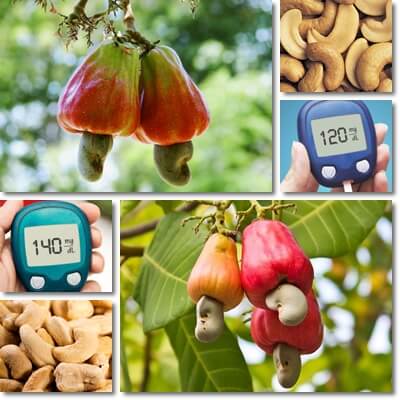Nuts and diabetes generally make a good pair, provided they are consumed in modest amounts, preferably not every day or even every other day. Even cashews are a good option for diabetics, despite their high-carbohydrate content. And the reason cashews are good for diabetes is because they are not high-glycemic foods so they don’t raise blood sugar levels too much or too fast. Given their nutritional profile, notably high-protein, high-fat, good fiber content, they slow down the rate of sugar absorption into the bloodstream and thus contribute to better blood sugar control in diabetics and non-diabetics alike.
Do cashews raise blood sugar?
All foods that contain carbohydrates raise blood sugar to various extents. During digestion, carbohydrates are broken down into their simplest form, sugar, then absorbed into the bloodstream where they raise blood sugar levels. Which means that cashews also raise blood sugar levels because they are an important source of carbohydrates (roughly 30 g of carbohydrates per 100 g). This is perfectly normal since it’s how the body gets energy from this type of nutrient. But the rise is minimal since the nuts are also high-fat, high-protein and a good source of fiber.

How fast or to what extent cashews and other foods raise blood sugar depends on several factors:
– how much carbohydrates a food contains
– carbohydrate profile, or how much of the total carbohydrate content is actually digestible and how much isn’t (for example, fiber isn’t digestible)
– how much of a food you eat at once, or serving size
– how much of other macronutrients a food contains (such as fat and protein which affect the way carbohydrates are processed – for example, the rate at which the sugar obtained from carbohydrates is absorbed into the bloodstream)
Cashews nutritional information relevant to diabetes (per 100 g, 3.5 oz)
Total carbohydrate content: 30.19 g of carbs per 100 g of cashews, of which:
– actual sugars: 6.67 g
– other digestible carbohydrates: 20.22 g
– (indigestible) dietary fiber: 3.3 g
Protein content: 16.67 – 18.22 g of protein
Fat content: 43.3 – 43.85 g, of which 7.8 g saturated, 23.8 g monounsaturated, 7.8 g polyunsaturated

Cashews glycemic index: 21-27 (low)
The glycemic index (GI) is a scale that measures how fast the carbohydrates in a food raise blood sugar levels. Below 55 is a low GI. Between 55-69 is a moderate GI. Between 70-100 is a high GI. Diabetics and anyone looking to control their blood sugar are advised to choose foods with as low a GI as possible. The glycemic index of both raw and salted cashews is estimated to be between 21 and 27, which is a low score. This means that cashews are a low-glycemic food and should have minimal effects on blood sugar.
Why are cashews low glycemic and not high?
The low GI score is possible because the nuts are high in protein (16-17 g per 100 g, roughly 5 g of protein per oz) as well as high in fat (43 g of fat per 100 g, 12-13 g of fat per oz), despite being also high in carbohydrates (30 g of carbs per 100 g, 8.5-9 g of carbs per oz). Both protein and fat take longer to digest so they will also impact the way the body digests carbohydrates and absorbs the sugar obtained from them. More exactly, the high fat and protein content will slow down the digestion of carbohydrates and the rate of sugar absorption into the bloodstream, contributing to better glucose metabolism control in both diabetics and non-diabetics.
Because cashews are low-glycemic, eating them with other, higher-glycemic foods should reduce those other foods’ effects on blood sugar. However, in order to enjoy their benefits for diabetes and more, it’s important to only have moderate amounts, infrequently. For example, it is recommended to have no more than 1 oz of cashews at once/per serving, preferably one serving a day and not have them every day. Ideally, not every other day either. It’s a good idea to add raw cashews or other nuts to salads or soups instead of croutons, pair with fruit or use them as snacks instead of high-carb, high-glycemic options. As a general rule, avoid salted nuts and seeds. The added sodium is likely to cause or worsen high blood pressure, a common complication in diabetes. Also see Properties and Benefits of Cashews.
Cashews glycemic load: 6-8 (low, calculated for 100 g serving)
The glycemic load (GL) is a scale that measures how fats the carbohydrates in a given serving of food raise blood sugar. Below 10 is a low GL. Between 11-19 is a moderate GL. Over 20 is a high GL. The GL of foods is calculated based on the glycemic index (21 – 27) times the number of carbohydrates expressed in grams, divided by 100.
- For a serving of 100 g of cashews (containing 30 g of carbs):
If the glycemic index for cashews is 21 (lowest value), the GL is 21 X 30/100 = 6.3 (estimated at 6 – low GL score).
If the glycemic index of cashews is 27 (highest value), the GL is 27 X 30/100 = 8.1 (estimated at 8 – low GL score). - For a serving of 50 g (containing 15 g of carbs):
21 X 15/100 = 3.15 (estimated at 3 – low GL score)
27 X 15/100 = 4.05 (estimated at 4 – low GL score) - For a serving of 1 oz, or 28.5 g (containing 8.55 g of carbs):
21 X 8.55/100 = 1.79 (estimated at 2 – low GL value)
27 X 8.55/100 = 2.3 (estimated at 2 – low GL value)
Of course, no two foods are exactly alike, not even when they are of the same kind. Nutritional aspects within the same type of food may vary, sometimes considerably, which is why the GI and GL values of cashews and other foods should be seen for what they are: estimates. As diabetics, these are not the only tools at your disposal to help you better manage your condition, so don’t rely on them exclusively. Counting carbohydrates, eating according to your nutritional requirements, based on your level of physical activity, keeping active, maintaining a healthy weight or losing weight and addressing problematic aspects of your health with good nutrition, exercise and medication when needed should be efficiently integrated in your lifestyle to help you with your condition.
Conclusion
Can diabetics eat cashews? Yes, diabetics can eat cashews with their condition, but in moderation and preferably not every day. Ideally, the choice should be made for raw, unsalted cashews and oil-roasted, salted options avoided to prevent high blood pressure and associated side effects. Cashews health benefits for diabetes include better blood sugar control as a result of a low glycemic index and low glycemic load score, better blood pressure numbers thanks to good amounts of potassium and magnesium as well as benefits for skin and wound healing from vitamins A, B5 and B6 and zinc.
Cashews are further good for diabetes because of their high unsaturated fatty acids content which promotes healthier blood cholesterol profiles and holds anti-inflammatory benefits primarily for the cardiovascular system. The nuts are a source of important antioxidants such as vitamins A and E, unsaturated fatty acids, copper and manganese. Lastly, the generous amounts of iron, zinc and B vitamins promote vitality, while the high-fat, high-protein profile ensures satiation and supports an active lifestyle, even encouraging weight loss. However, cashews should be avoided at all times and in all forms if you know or suspect you are allergic to them, diabetic or not.
